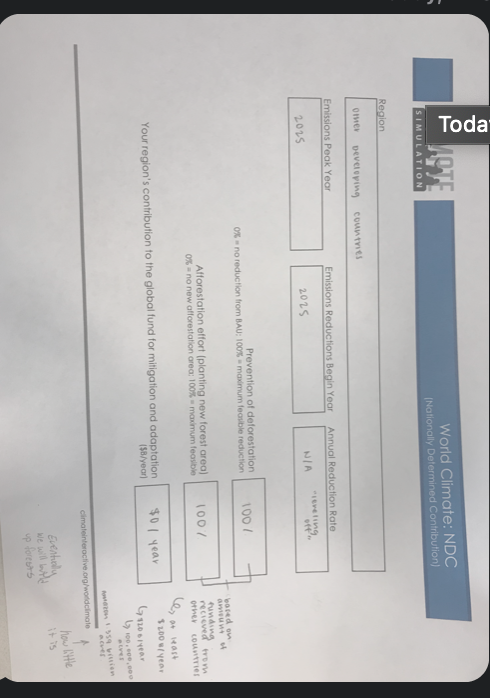Over the past two class sessions, you participated in a World Climate negotiation role-playing exercise that explores the science and geopolitics of international agreements on climate change. The role-playing is grounded by a computer simulation of the dynamics of the climate system, C-ROADS, that has influenced the actual global negotiations. World Climate has been played by more than 30,000 people, from middle-school students to UN officials in dozens of countries worldwide. By participating in World Climate, you have hopefully gained insights into the causes of climate change and can now see the possibility of success in addressing the climate challenge.
· When I played my role in the policy exercise, I felt frustrated that no one was willing to contribute money. I represented the other developing nations, and it quickly became clear that other countries did not want to contribute to our forestation efforts, despite the fact that our countries are most important in stopping CO2 emissions.
· How did your reaction, comments, feelings; and shifts (if any) in negotiating positions evolve across the rounds and discussions? My feelings improved as the negotiating rounds went further. Countries contributed more and more money to our fund after realizing that our fund was worth contributing to. We received more and more money, so I felt validated that our cause was worthy. I also felt good because I knew we would now have the funds to make an actual impact in reducing carbon emissions.
· How did your group change their ideas?Although we changed our reasoning about why we needed at least 200 billion, our ideas about the amount of money never changed. We came up with more evidence and reasoning to convince other countries to contribute, but we realized from the beginning that this effort would cost a lot of money regardless. We also agreed to allocate money to different resources.
· What prompted that change? As we realized we were not getting enough money, we came up with more reasons why we needed it. In addition, as we came up with these reasons, we realized that in fact we deserved a lot more money than we initially anticipated, but we still had to compromise with an amount of money lower than what we originally wanted. We also allocated a different amount to different resources to maximize our co2 emission decrease by contributing to green energy. In order to assuage countries’ worries about corruption, we also allowed them to control where their funds went.
· In the end, do you think that emissions can be cut?I believe that emissions can be cut, but it would take full commitment to decreasing emissions at the expense of every country’s economy. In addition, we will probably not be able to cut emissions down to an acceptable level until some negative changes have already happened, and we can almost defintiely not reach our goal of temperature raising less than 2 degrees. However, we still must try our best otherwise our entire planet will be gone. In addition, this is difficult because countries are greedy and will never fund the amount needed to the project. I think our only hope is investment into management technology.
· What were the major costs and barriers to implementation of participant proposals?Green energy is much more expensive, and this means that our economy will slow if we actually implement it. In addition, everyone has different ideas about which proposals will actually work, meaning that individual projects did not receive enough funding because every country wanted to fund different initiatives. Countries were also worried about corruption, we disincentivized their contribution.
· How can we catalyze change in the US? We must stop emissions through agriculture and industry by demanding big companies make a change. Although limiting individual consumption is important, we can make the most impact by reducing larger corporation emissions and consumption. This only comes through consumers demanding change or the government making large consumption and production illegal. We also have to dedicate a significant amount of funds to make real change. This again requires the support of the citizens and the demanding of the citizens to make this change.
Pictures of our first negotiations

:
Resources:
- Simulation of Sea Level Rise: http://flood.firetree.net/
- Climate Bathtub Simulation: https://www.climateinteractive.org/tools/climate-bathtub-simulation/
